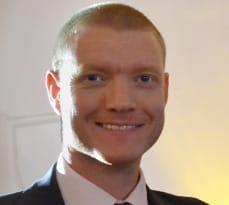James Whittingham (MPhil in Management 2005) and Ronald Reynolds, chair of Shaping Cloud and CEO and founder of New York-based investment company DayRiver

Active investor and strategic supporter James Whittingham believes he’s found the perfect partner in Ron Reynolds, with their shared focus on finding the right answer
James:
For me, the key part of having a mentor is someone who can provide things that go beyond what you can get out of a book. I’ve probably got a selection of mentors – family members who have given me encouragement and guidance, colleagues and business partners who have challenged me and, of course, friends who have listened to my problems and concerns over the years – but from the business world, Ron is a real inspiration.
I first met him when he and I worked together at Blenheim Chalcot, back in 2006. He was my first direct boss after Cambridge so he had the unenviable task of turning me from a student to a businessman! He’s quite different to me in terms of our approach to creating businesses. I’m generally enthusiastic, optimistic, and always looking for the next big thing. He’s more measured, analytical, and structured.
But we both complement each other. You need the person who wants to get out there and do it – but you also want the other side to balance it – someone who will say “have you thought about this? Have you considered that? What if you did this instead of something else?” He’s not there to agree with me and pat me on the back and say great job, well done. He’s there to question me and challenge my assumptions. Ultimately, that’s how you get to the right answer.
Ron and I have been involved in all manners of business and investment together – from forming new startups, to exiting listed companies. Our work also included buying an Indian cricket team that resulted in me spending four years living in Mumbai!
Our relationship is not a formal mentor role. We haven’t felt the need for that. But over the years I’ve got in touch with Ron about specific questions and issues, and he’s always been there as a colleague and friend. And of course, he’s now chairman of Shaping Cloud, which is going from strength to strength. So our goals are very much aligned.
It’s incredibly valuable to have a mentor like Ron. He’s approachable, but he’s also focused, passionate, and hardworking. He recognises that people need help on their career journey. He brings people into the fold, encourages them, and gives them the belief to succeed. I think he enjoys that role, and it’s something I’d like to do myself in the future.
Ron:
James is one of those folks who stay in touch. That’s rare. He works very hard at interacting with whoever around him will help him move forward – and I mean that in an entirely positive way.
He was one of my analysts at Blenheim Chalcot – I was the commercial director and partner. James always wanted to improve himself. He would have questions: “how can I continue to develop myself? What else is happening right now? Am I thinking about things the right way? When you criticised what I was doing, was it the right criticism for the right reasons?” And that’s how our relationship evolved. Plus, when James started using his entrepreneurial instincts outside the firm, his interests very much crossed with mine. So we had a lot to talk about.
Now that I’m chair of Shaping Cloud, our relationship is a little more formalised. But before that, it was usually as and when. Something would be bothering him and he’d like a chat.
For me, the mentor/mentee relationship is action-orientated. When people call to say that they have no idea it just means that they haven’t started to think about it and they’re being a bit lazy. Those are harder conversations to have. My advice to those people is usually: step one, pull your finger out; step two, grow up; and step three, call me back when you’ve done something.
But James isn’t like that. He’s a doer. People who call you with a problem that they’re working on are easy people to talk to, and I’m happy to carve out time for those people. He’ll call when he’s done something – thought about a problem, or researched something – and I respond to that, which is always easier to do.
What do I get out of it? Mentoring keeps me fresh and sharp. The next generation wants real insights – insights that you cannot simply Google, because they have already done that before I speak with them.
James is going through a really interesting time. He’s working hard, making investments and carving out his space in this world. It’s great to be able to give advice that’s very relevant to 2014 and all the challenges in the economic environment that we have – and it allows me to be even more helpful in the advice I give other folks.

